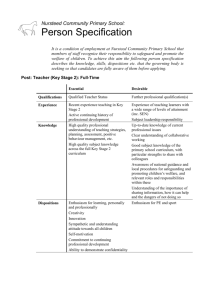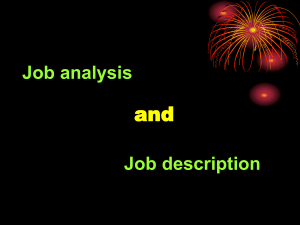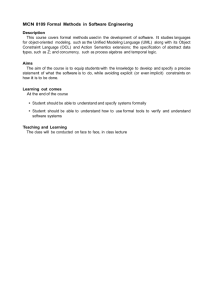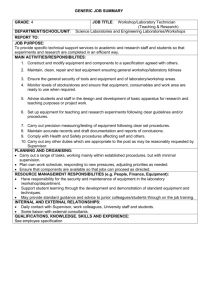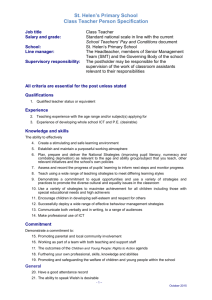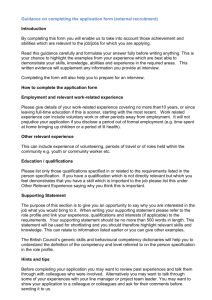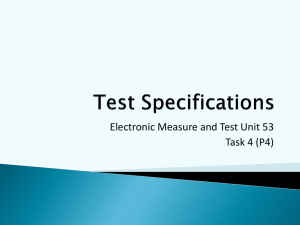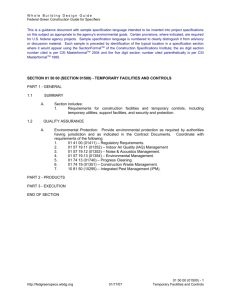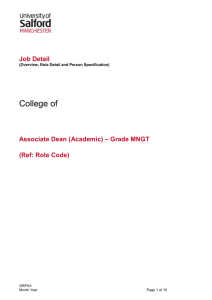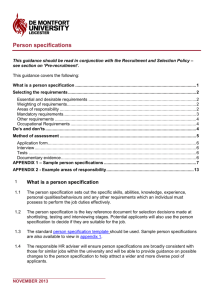Writing a personal statement
advertisement
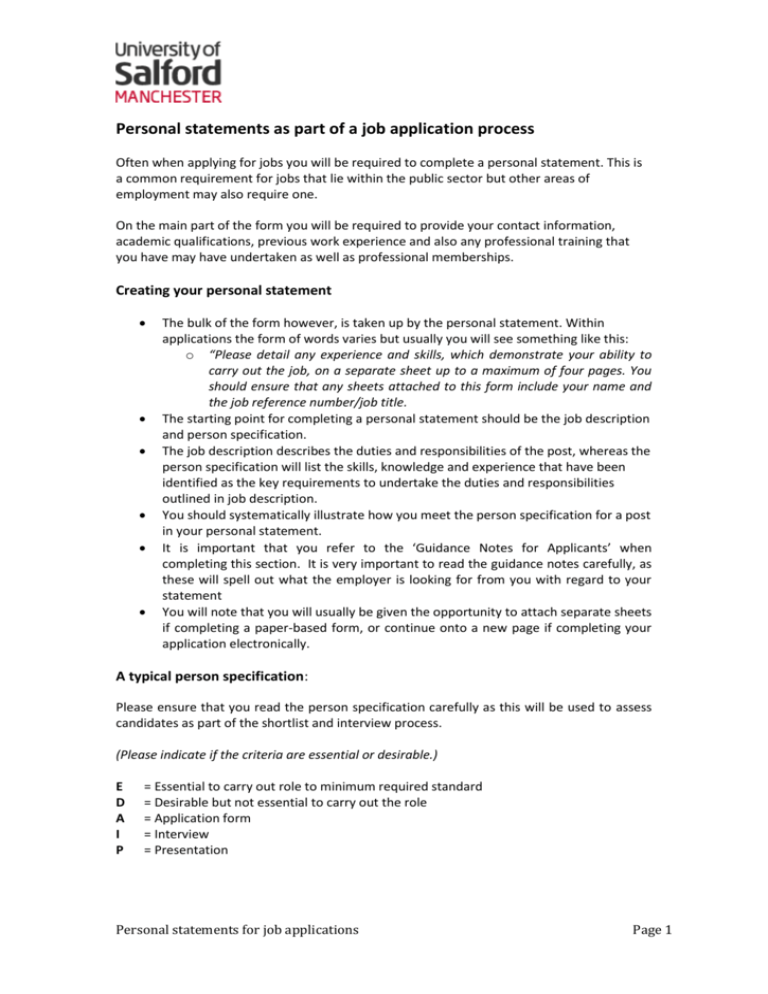
Personal statements as part of a job application process Often when applying for jobs you will be required to complete a personal statement. This is a common requirement for jobs that lie within the public sector but other areas of employment may also require one. On the main part of the form you will be required to provide your contact information, academic qualifications, previous work experience and also any professional training that you have may have undertaken as well as professional memberships. Creating your personal statement The bulk of the form however, is taken up by the personal statement. Within applications the form of words varies but usually you will see something like this: o “Please detail any experience and skills, which demonstrate your ability to carry out the job, on a separate sheet up to a maximum of four pages. You should ensure that any sheets attached to this form include your name and the job reference number/job title. The starting point for completing a personal statement should be the job description and person specification. The job description describes the duties and responsibilities of the post, whereas the person specification will list the skills, knowledge and experience that have been identified as the key requirements to undertake the duties and responsibilities outlined in job description. You should systematically illustrate how you meet the person specification for a post in your personal statement. It is important that you refer to the ‘Guidance Notes for Applicants’ when completing this section. It is very important to read the guidance notes carefully, as these will spell out what the employer is looking for from you with regard to your statement You will note that you will usually be given the opportunity to attach separate sheets if completing a paper-based form, or continue onto a new page if completing your application electronically. A typical person specification: Please ensure that you read the person specification carefully as this will be used to assess candidates as part of the shortlist and interview process. (Please indicate if the criteria are essential or desirable.) E D A I P = Essential to carry out role to minimum required standard = Desirable but not essential to carry out the role = Application form = Interview = Presentation Personal statements for job applications Page 1 PERSON SPECIFICATION POST: GRADUATE SURVEYOR POST NO: AK2304 & AK2305 QUALIFICATIONS 1. A relevant property degree and eligibility for student membership of the Royal Institution of Chartered Surveyors. E A/I EXPERIENCE AND KNOWLEDGE 1. Post graduation experience as a “general practice” Surveyor. D A/I 2. Preparation and presentation of reports. D A/I 3. A good knowledge of current property Legislation. D 4. Use of computers in Estate Management. D SKILLS 1. An ability to communicate clearly and negotiate at all levels both orally and in writing (including report writing skills). E E A/I Interview A/I E A/I/P Interview 2. Ability to assess and reconcile conflicting demands and issues and work on own initiative. E I 3. Ability to use personal computers and relevant E I/Test E I software (e.g. Microsoft Office). 4. Project management skills - e.g. to manage property related projects. OTHER 1. An appreciation of the need for confidentiality and understanding of data protection requirements. E 2. An understanding of how customer focussed service can be implemented and delivered. E I 3. Possession of a full driving licence. D A/Licence Personal statements for job applications E IInterview Page 2 The person specification clearly lays out the structure that your personal statement should take, i.e. main headings (Qualifications, experience and knowledge etc) and sub-headings (Ability to communicate clearly, an appreciation of the need for confidentiality etc). Prior to completing the form it will is essential that you look at the requirements stated in the person specification and list the evidence you can provide. This evidence will be based on examples taken from your experience that illustrate how you have acquired the knowledge, gained the experience or applied the skills required to undertake the role applied for. In terms of structuring your personal statement it should contain the following elements: 1. An introduction clearly outlining your interest and motivation for applying for the post advertised 2. A main body where you address the points in the person specification, either individually or as a group if some points within the specification are similar or closely related, e.g. teamwork and interpersonal skills 3. A concluding paragraph reiterating key points within your application, emphasising your suitability for the position The main bulk of your statement will consist of short paragraphs that will provide the evidence of how you meet the criteria specified by the employer. When writing these statements you might find the following framework useful in helping you to structure your statements: S = Situation (Begin by placing the example you are using into some kind of context for the reader, i.e. when and where the event took place) T = Task (Describe what it was you had to do - what was the overall objective? Where there any constraints acting upon you as an individual, or as a group, e.g. time, budget etc.?) A = Action (Describe what you did to complete the task. NB: even if you are describing a team situation, describe how you made a difference to the outcome and role you took within the team.) R = Result/Review (What was the outcome? What did you learn from the experience?) In summary here are the main points of what constitutes an effective personal statement: A well written introduction that holds the reader’s attention and outlines your reasons for applying for the post A clear statement of why you want to work for the employer Clear evidence of how you match the requirements stated on the person specification (with examples from placements, degree programme/dissertation, outside interests, volunteering, part-time/previous employment and personal experience). This should be clearly laid out using the person specification for your structure Personal statements for job applications Page 3 A concluding paragraph that emphasises the key points of your application and which provides a summary of your interest in and suitability for the position advertised. Some examples of giving evidence on a statement Excellent interpersonal, communication, and presentational skills, both written and oral All of my roles have required strong communication skills with internal and external parties at all levels within the organization. When delivering training, providing face to face support or solving telephone enquiries, it has been essential to explain things in a simple and logic manner. As a mentor to a modern apprentice, I can demonstrate the ability to motivate through the use of positive language and questioning skills. As a champion of the SYTEC system, I was involved in a variety of presentations to raise the profile of the system both internally and externally. I presented SYTEC at external events with other local authorities that were considering purchasing the system. Increased confidence in presenting was a key outcome during my time on this project. Effective written communication skills have been essential in communicating with a wide variety of colleagues from different professional disciplines as well as third parties. Various roles have involved servicing high-level meetings and producing accurate and concise minutes. Written reports, minutes and electronic communication all demonstrate my ability to communicate effectively. Be able to demonstrate numeracy, good analytical and organisational abilities. I managed the budget which has a maximum outgoing of £633,000 per annum. This involves monitoring actual expenditure against projected expenditure to ensure committed expenditure remains within the set limits. While working at Company X, I was responsible for dealing with complex offset mortgage enquiries which provided me with an opportunity to enhance my numerical abilities. During my placement with team X, I analysed complex performance data. I worked closely with ICT to build tolerances to ensure all directorate performance data was completed by set deadlines. An escalation procedure was developed that automatically triggered an email escalation process if data was not entered within given timescales. The ability to work under pressure and to meet tight deadlines. As team X is a small team and has a lot of ongoing projects, I work on a number of projects at the same time. Time pressures have been tested further as I am currently working in both team X and team Y. When working under pressure and to tight deadlines, I have used time management and prioritisation to ensure all tasks have been completed in an accurate and timely manner. Studying part-time in addition to working full-time has meant that I have needed to prioritise my workload in order to complete numerous assignments to set the deadlines. In doing this I have prioritised in accordance with the set timescales and the degree of work involved. Personal statements for job applications Page 4 Questions to ask yourself: Why have you chosen to apply for this position? Think about your academic qualifications, work experience and career development. Use the opening paragraphs to answer this question by demonstrating your knowledge of the employer and your suitability for the position. This should be considered your career summary. What Qualifications, Knowledge, Skills and Other requirements does the Employer require? Try to answer each competency as laid out in the job specification point by point so that it is clear for the Employer to see, don’t jump from point to point or make the employer work to find the answer, this will frustrate them. Do you have what they want? Match your skills and experience to the Essential and Desirable criteria as best you can. In research statements, the focus will primarily be on your academic and research skills, your relevant work experience and administrative duties. Have you met the Essential Criteria and Desirable Criteria? Successful applicants are usually shortlisted for interview on the proviso that they have met all the Essential criteria. However it is important to try to meet as many of the set desirable criteria as possible. Sometimes if there has been a huge response in the number of applications, employers use the desirable criteria to try to whittle down the number of candidates to invite to the next stage of the recruitment process. . Application Form Checklist: Have you… Read the job description and person specification? Created a draft version? Addressed the Essential criteria? Answered as many of the Desirable criteria? Provided concise, yet specific examples using the STAR technique? Used a variety of examples from academia, work experience and extracurricular activities? Made effective use of headings and bullet points Submitted the form before the closing deadline? Personal statements for job applications Yes/No Yes / No Yes / No Yes / No Yes / No Yes / No Yes / No Yes / No Page 5 Remember for further advice or help with your application, you can: Book an appointment with a Careers consultant for help with your application http://www.careers.salford.ac.uk/contact Attend one of our workshops on CVs and applications http://www.careers.salford.ac.uk/page/eventsdevelop Download our Guide to Completing Application Forms http://www.careers.salford.ac.uk/page/apply_interview#appform Remember there are no short cuts when it comes to completing applications. A presented and structured application will pay dividends in the long term. Good Luck!! Updated September 2013 (FC) Personal statements for job applications Page 6
